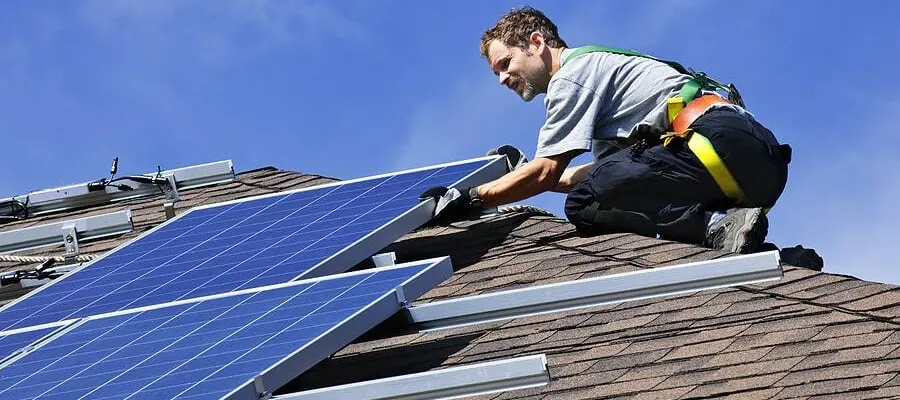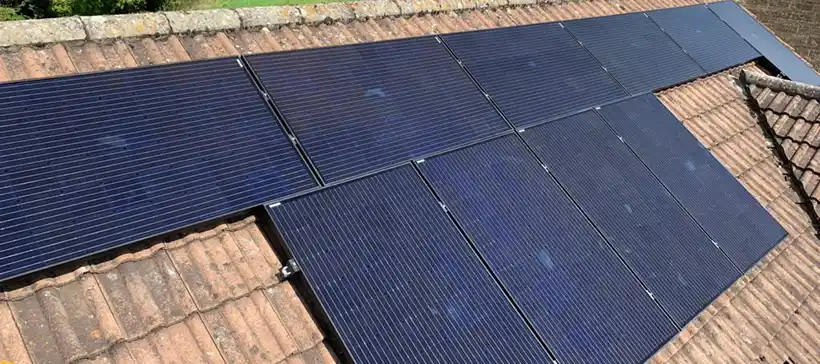- HOME
- ABOUT US
- SOLUTIONS
- Metal Roof PV Mounts and Systems
- Flat Roof Solar Panel Mounting Systems Solutions
- Tile Roof Solar Mounting Systems Solutions
- Solar Tracking Solutions for Commercial PV Projects
- Ground Solar Mounting Systems Solutions
- Floating Solar Solutions - PV Systems
- PV Solar Carport Mounting Systems Solutions
- Balcony Solar Panel Mounting Systems Solutions
- PRODUCTS
- PROJECTS
- COMPANY NEWS
- BLOG
- Contact Us

Solar roof panels and other forms of natural energy are an important step forward as the world begins to rely less on fossil fuels and more on alternative energy sources. Installing solar panels on your roof is also an excellent way to generate electricity for your home and business, as well as the grid, while minimizing your environmental impact.
However, there are several factors to consider before you begin the installation process. We've put together a list of the top 8 things you need to think about before installing those rooftop solar panels to help you decide if solar power is right for you, your home, or your business.
#1 Installing New Panels on an Old Roof
Ideally, the array's and roof's lives should be roughly equal. Your solar panels could generate electricity for 20 years, and your financing or Power Purchase Agreement could last the same amount of time. There's no point in installing such a system on a roof that has only about 10 years of life left. Many roof systems, such as a metal roof or cool roofing membrane, can last for 20 years or more and are ideal for supporting a solar array.
#2 Faulty Installation
One of the most common, but potentially most serious, issues is improper or incorrect solar panel installation. If the panels are not properly installed, the following problems may occur:
● Faulty solar panel alignment
● Roof damage during installation
● Roof water flow disruptions
● Not meeting the power statistics expectations
It is best to hire a qualified, professional solar panel installer to solve/avoid such problems. Make time to examine your solar installer's portfolio, which includes the various installations they have completed. Ensure that they learn the best installation practices so that you can have a safe and dependable solar experience.
#3 Improper Orientations
Installing the panels randomly will not yield the desired results and is one of the most common mistakes to avoid. While it is incorrect to believe that solar panels must only be installed on roofs facing a specific direction, their orientation is undeniably important. Even the most efficient panels are less productive when they are positioned incorrectly.
In a broader sense, your region will also influence the orientation. For example, in northern hemisphere countries such as the United States and India, south-facing roof sections receive the most sunlight throughout the year, making them the best-oriented solar panel system. Conditions and directions are diametrically opposed in southern hemisphere countries such as Australia.
Similarly, east-facing solar panels are ideal for buildings that are primarily active in the morning, such as schools. West-facing panels, on the other hand, are more productive in the afternoon, making them ideal for buildings that are open during those hours. Solar trackers could be used to improve the system even further. A solar tracking system follows the position of the sun to capture the most solar energy.
#4 The Conditions of the Rooftop

Roofs come in a variety of shapes and sizes. Make sure your roof has enough space for the solar panels before proceeding with any installation. If there isn't enough space, you won't get the expected return on your investment.
The weight of your roof will increase after you install solar panels. If the weight of these solar panels becomes too much for your roof to support, it may collapse. This is extremely dangerous for a variety of reasons, not to mention costly. To avoid both scenarios, it is critical to have a professional inspect your roof to determine if additional support is needed to complete the installation.
#5 Bird Nesting
Birds can pose a significant problem for homes equipped with solar panels in some areas. When crows or pigeons nest in the space under the panels, it can cause damage to your roof and be annoying because of the noise these animals make. To prevent birds from getting underneath, the best solution is to install mesh, wire, or spikes around the edges of the panels.
#6 Wiring Issues
Faults in the wiring are another common issue that reduces the performance of solar panels. Loose connections can disrupt electricity production as well as oxidation and corrosion. You should not attempt to interfere with the wiring if you are not a licensed electrician. The safest option is to contact a reputable solar panel electrician and have them thoroughly inspect the panels to ensure there are no problems.
Other issues that may arise with your solar panels include internal corrosion, delamination, roof issues, and even snail trails. In general, if you have problems with your solar panels, you should contact a professional and ask them to inspect your panels to identify and resolve problems. Of course, this comes at a cost, so shop around for the best deal. It's also a good idea to look into preventative measures, and manufacturers who have implemented mitigating technologies for common problems are a good bet. Because prevention is the most cost-effective measure, don't dismiss potential issues when there's something you can do to avoid them.
#7 Not Having a Maintenance Plan
Even without solar panels, a roof will require maintenance and inspections on a regular basis. However, with solar installed, that requirement is heightened. If your panels are covered in dust or sitting in a pool of standing water, you will not see a return on your investment. Regular roof and solar panel maintenance is always advised to prevent minor issues from becoming major ones.
Dealing with severe weather, such as lightning storms, hurricanes, and hail, is an important part of maintaining your solar power system. Some solar power equipment may be damaged as a result of these events. While some insurance policies will cover such events, it is something to think about, especially if you live in an area where this type of weather is common.
#8 Warranties
Warranties are an essential part of safeguarding your solar panels and other related equipment. If something goes wrong with your solar panels, having a warranty allows you to hold the manufacturer accountable — at no extra cost to you. There are some incentive programs (available in a variety of states) that require you to have a warranty on your solar equipment. These programs will not accept your application if you do not have a warranty.

